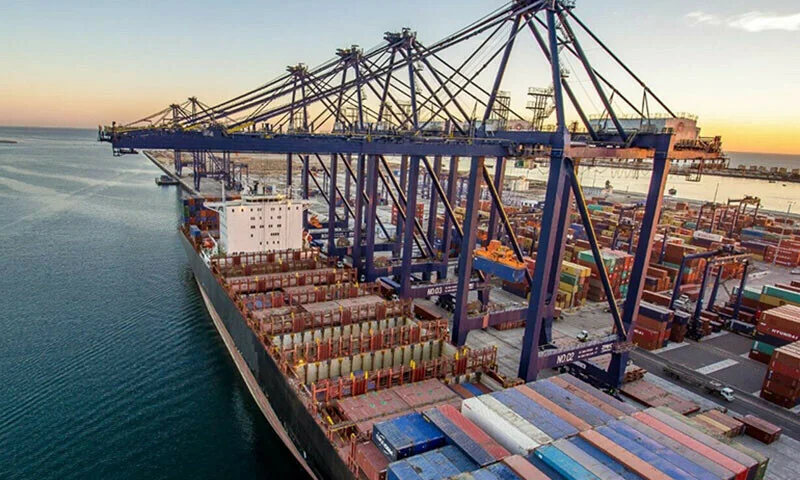KARACHI: A major international shipping company has announced the introduction of an “Emergency Operational Recovering Surcharge” on all import and export shipments to and from Pakistan, citing rising geopolitical tensions with India as the driving factor behind the decision.
The move comes in the wake of heightened hostilities following an incident in Pahalgam on April 23, which reportedly involved a missile strike by India on Pakistani territory.
The subsequent spike in bilateral tensions has sparked fears of broader conflict and prompted commercial carriers to reassess the risk of operating in the region.
Industry insiders indicate that several global shipping lines are now evaluating whether to halt direct services to Pakistani ports altogether, given the increased threat environment.
Amid this uncertainty, a leading shipping firm has opted to impose a surcharge of up to $800 per unit on cargo moving to and from Pakistan.
The surcharge, described as a response to rising operational and insurance costs under the current volatile conditions, will affect cargo movements across key global trade routes.
For shipments from Pakistan to Europe, the Mediterranean, the United States, and Africa, and from Asia to Pakistan, the surcharge will be $800 per unit.
Meanwhile, cargo shipped from Europe, the Mediterranean, the U.S., Canada, and Africa to Pakistan, or from Pakistan to Asia, will face a surcharge of $300 per unit.
In an official notice, CMA CGM, one of the world’s top shipping and logistics companies, confirmed the implementation of the new charges, citing significant disruptions to regional operations.
“Recent geopolitical developments in South Asia have adversely affected our ability to maintain standard operational flow,” the company stated.
“To continue offering the quality of service our clients depend on, we are compelled to modify our pricing structure to reflect current risks.”
Global Surcharges
The surcharges will come into effect on May 15, 2025, for most regions, and June 6, 2025, for shipments originating from the United States, Latin America, and Australia.
These charges will apply to all cargo, whether it is already in transit or scheduled to sail after the implementation date.
Exporters from Canada to Pakistan will see the surcharge applied from May 15, while the same will apply to U.S. shipments beginning June 6.
Even among the carriers that continue to serve Pakistani ports, many are reportedly applying a War Risk Premium, further increasing freight charges and logistical costs.
Shipping industry experts warn that these developments may trigger broader cost increases across the board.
Rerouting vessels or altering port destinations due to security considerations leads to higher fuel consumption, longer transit times, and more complex logistics operations—costs that are ultimately passed on to customers.
Adding to the strain, Pakistan has implemented a series of maritime restrictions aimed at defending its sovereignty and national interests.
The Ministry of Maritime Affairs has issued directives banning Indian-flagged vessels from docking at any Pakistani port, while simultaneously prohibiting Pakistani-flagged vessels from calling at Indian ports.
This action follows India’s recent curbs on Pakistani maritime traffic.
MInistry’s View
The Ministry’s official communication, issued through the Port and Shipping Wing, cites the “evolving maritime situation” in the region and stresses the importance of protecting national security and economic interests.
Read More: NCERT Warns of Cyber Attack Risks from India
“To uphold maritime sovereignty, safeguard our economy, and respond appropriately to recent developments, these measures have been enacted with immediate effect,” the notification read.
Further compounding the situation, the Pakistani government last week also imposed a complete ban on the import, export, and transit of goods originating from India, including items routed through third countries. Authorities framed the decision as being in the public and national security interest.
These policy shifts and rising security concerns are expected to significantly disrupt trade flows, with a particular burden falling on Pakistan’s already struggling export sector, which is contending with rising production costs, supply chain disruptions, and declining competitiveness in international markets.
Also Read: Pakistan Ready to Respond to Indian Aggression, Says Khawaja Asif
Industry representatives warn that the new surcharges and trade restrictions will intensify pressure on exporters, reduce profitability, and could lead to further contraction in an already fragile trade environment.
Shipping experts also caution that ongoing uncertainty in the region may result in further withdrawal of international carriers, compounding the logistics and cost challenges facing Pakistani traders.









